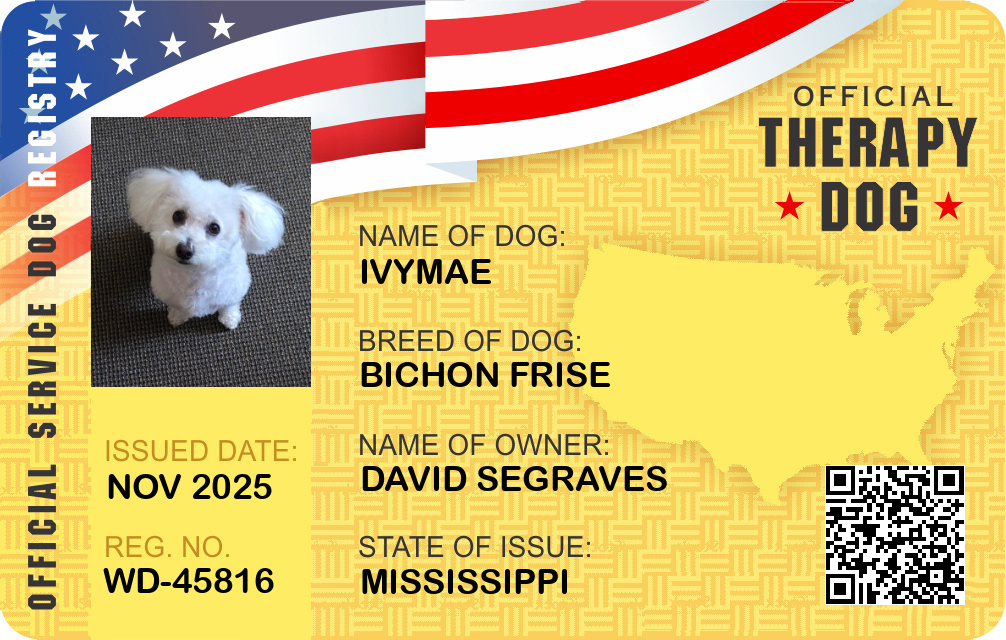Mississippi Emotional Support Animal Laws

Overview of ESAs and Legal Definitions in Mississippi
What is an Emotional Support Animal?
Emotional support animals (ESAs) are companion animals that provide therapeutic benefits to individuals suffering from mental or emotional disabilities. Unlike service animals, which are trained to perform specific tasks for people with disabilities, ESAs provide comfort simply through their presence. In Mississippi, as in other states, an ESA can be any type of animal, commonly dogs or cats, that offers mental health support to its owner.
How ESAs Differ from Service Animals
In Mississippi, the distinction between ESAs and service animals is critical. Service animals, primarily dogs, are trained to perform specific tasks and assist individuals with disabilities, such as guiding visually impaired individuals or detecting seizures. They are afforded more comprehensive access rights under the Americans with Disabilities Act (ADA). In contrast, ESAs do not require specialized training to perform tasks and do not enjoy the same range of public access rights. This distinction means that while service animals can accompany their owners in most public places, ESAs are mainly covered under housing laws.
Key Federal Laws Affecting ESAs (e.g., FHA, ACAA)
Federal laws provide the framework for ESA protections, which Mississippi adheres to without significant modification. Key federal statutes include the Fair Housing Act (FHA) and the Air Carrier Access Act (ACAA). The FHA mandates that individuals with ESAs must be allowed reasonable accommodation in housing, forbidding landlords from discriminating against individuals with verified ESA needs. The ACAA, recently revised in 2021, no longer mandates airlines to permit ESAs in the cabin, meaning individual airline policies may vary and could affect ESA owners traveling by air from Mississippi.
State-Specific ESA Laws in Mississippi
Housing Rights and Responsibilities
In Mississippi, housing laws pertaining to ESAs align with the federal Fair Housing Act mandates. ESA owners must be allowed reasonable accommodations, meaning landlords cannot legally refuse housing or impose extra fees, such as pet deposits or higher rent, for tenants with ESAs. Landlords can, however, request documentation, usually in the form of an ESA letter from a qualified mental health professional, confirming the individual's need for the animal due to a mental or emotional disability.
Public Access and Accommodation
Mississippi does not provide ESAs with the same public access rights as service animals. This means ESAs are not guaranteed entry into public places like restaurants, hotels, or stores, which are otherwise required to accommodate service animals. Establishments may choose to allow ESAs at their discretion, but this is not mandated by law. Therefore, ESA owners should always check with the management of public venues in advance to confirm their policies regarding ESAs.
Transportation and Travel Rules
Following the revisions of the ACAA in 2021, airlines are no longer required to accommodate ESAs in their cabins, a policy reflected in Mississippi's alignment with federal law. Many airlines now treat ESAs as pets, adhering to their standard pet policies, which may entail fees and confinement to the cargo hold rather than the passenger cabin. Therefore, ESA owners in Mississippi planning to travel by air should inquire with airlines about their specific policies and prepare accordingly.
Employment and Workplace Considerations
Under both federal and Mississippi law, employers are not obliged to accommodate ESAs in the workplace unless the ESA also qualifies as a service animal. The Americans with Disabilities Act, which guides workplace accommodations, does not categorize ESAs under the same requirements. However, it is advisable for ESA owners seeking workplace accommodations to engage in open dialogue with their employers. In some instances, employers may choose to allow ESAs on a case-by-case basis, depending on the nature of the job and the workplace environment.
Documentation, Requirements, and Processes in Mississippi
ESA Letters and Who Can Issue Them
The cornerstone of the legal recognition of an ESA in Mississippi is the ESA letter. This document must come from a licensed healthcare provider, such as a psychologist, psychiatrist, or therapist, with authority in diagnosing mental health conditions. The letter should confirm the individual's need for the ESA to alleviate symptoms of a mental or emotional disability, and it should be current, typically dated within the past year to ensure up-to-date v
Register Your Dog Instantly
alidation.Registration, Certifications, and Common Misconceptions
Mississippi does not require, nor does it recognize, official ESA registries or certifications, a common source of confusion for ESA owners. Contrary to some misrepresented claims, purchasing certifications or registration from online databases does not confer legal rights or recognition upon an ESA. Instead, the ESA letter, provided by a qualified mental health professional, is the only documentation necessary to secure housing accommodations under the law.
Landlord, Business, and Provider Verification Rules
When dealing with landlords or service providers, ESA owners in Mississippi should be prepared to produce a valid ESA letter upon request. Landlords may verify the authenticity of an ESA letter by contacting the issuing mental health professional but cannot ask for detailed medical records or extensive information about the tenant's condition. Businesses, on the other hand, are not required to accommodate ESAs but can ask whether an animal is required because of a disability and what work or task the animal has been trained to perform if they suspect it might be a service animal.
Rights, Limitations, and Legal Risks
Rights ESA Owners Have in Mississippi
ESA owners in Mississippi have the right to:
- Reasonable accommodation in housing, without additional fees or deposits imposed due to their ESA.
- The privacy of their medical information, disclosing only the necessary documentation to landlords.
Limits on ESA Protections and Common Restrictions
ESA protections are primarily housing-related in Mississippi. Public access rights are not extended to ESAs, aligning with federal standards. This means:
- ESAs can be denied access to public places where animals are otherwise prohibited.
- Air travel may involve additional costs and restrictions set by individual airlines.
Penalties for Fraud or Misrepresentation
Misrepresentation of an animal as a service animal when it is not, including falsifying ESA letters or documents, can result in penalties under Mississippi law. This may include fines and potential eviction from rental properties. The state's legal framework dissuades fraudulent claims to ensure legitimate ESA owners are recognized and protected.
Practical Guidance for ESA Owners in Mississippi
How to Qualify for an ESA Legitimately
Qualifying for an ESA in Mississippi involves:
- Evaluation and diagnosis by a licensed mental health professional, affirming the need for an ESA.
- Obtaining a legitimate ESA letter stating the individual's mental or emotional disability and the role of the ESA.
How to Talk to Landlords, Airlines, and Employers
When discussing ESA accommodations:
- With Landlords: Present your ESA letter, explain the animal's role in supporting your mental health, and clarify that you are seeking reasonable accommodation under the FHA.
- With Airlines: Confirm the airline’s policy on ESAs well in advance, understanding any applicable fees or required documentation.
- With Employers: Approach with a clear request, citing any personal needs the ESA fulfills, yet understanding their non-obligatory status under the ADA.
Tips for Avoiding Scams and Legal Problems
To avoid complications:
- Verify: Ensure any ESA letter is issued by a licensed professional; avoid websites promising expedited ESA registration or certification.
- Clarify Rights: Know your legal rights under federal and Mississippi laws, particularly regarding housing accommodations.
- Be Truthful: Misrepresenting an animal as a service animal can lead to legal issues.
Summary of ESA Laws in Mississippi
- ESAs provide emotional support and are distinct from service animals with more limited rights.
- Federal laws like the FHA provide the main protections for ESAs, focusing primarily on housing accommodations.
- There are specific ESA documentation requirements; only legitimate ESA letters from licensed professionals are necessary in Mississippi.
- ESA owners must navigate different access policies for travel and public areas individually.
- It is crucial for ESA owners in Mississippi to understand their rights and avoid fraudulent practices to ensure compliance and avoid legal repercussions.











